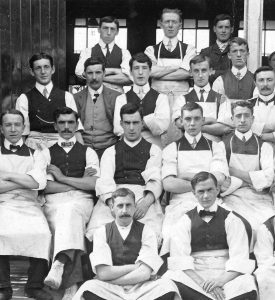
The Cheapest Holiday in the World
The Tourist, 1899
Clouds.
“Dispel clouds,” says the Philosopher. “Why?” says the cynic, “for nearly everything is obscure.” “Then it shouldn’t be. Clear the air. Make plain the way. Etc. Etc.” So, the cynic caves in. And what, by the way, has this to do with the Camp? A good deal my enquiring friend, for the world is woefully obscure about this camping racket. One thinks its visitors live in the rain; another one wonders if they are being washed out by the sea; another doubts if there be anything to eat but bread and cheese, and so on. Then we come in; not to give any fantastic description of camping life, but a few hard facts and a few quotations from actual experiences.
Joys and Benefits.
Says a camper:- “camping out as a mode of spending ones summer holidays becomes more popular and fashionable year by year. The fears of discomfort, colds, rheumatism, etc. which will rise in the minds of the uninitiated have been proved over and over again to be altogether groundless, while the novelty, freedom, economy and wonderful benefit to health of camping out compare most favourably with the stuffiness, annoyances and over charges of the lodging house or hotel. The International Young Men’s Holiday Camp, which is again being held continuously from May to October near Douglas, Isle of Man, offers an excellent opportunity for those to avail themselves of all the joys and benefits of camping without the serious trouble, risks and responsibility of privately arranged camps.”
The Situation
Says another:- “the situation of this camp could scarcely be surpassed. The camp estate occupies the slope of a high hill and within the bounds of its unclimbable fences are many acres of land clad in purple heather, bramble bush, grass and wildflowers. The prospect from the camp includes magnificent views of the Manx Coast, and, in clear weather, of the Northumberland and Welsh mountains, while from the summit of the camp hill a most extensive view is obtainable, extending from Douglas Bay on the left over a larger portion of the Island. The rocky sea coast fringing the camp grounds on the east is very grand, and here will be found many a grassy nook sheltered among the towering rocks, where, “far from the madding crowd” the reader may enjoy his book in perfect peace, while the sea breezes bare to him such stores of ozone as shall fit him for another year of vigorous toil.”
He continues:- “those who are fond of fishing will be glad to know that the deep gullies which cleave the rocks within the camp grounds, have the reputation of being the best fishing places along the coast. Along these rocks, the confident swimmer will find places from which he may dive in to deep water, clear and transparent as crystal, but beginners and most others prefer the gradual slope of the bay at the north end of the camp grounds.”
Dry Particulars
Campers from inland towns will find that cheap excursion tickets to Douglas are obtainable at all railway stations. Passengers and their luggage are conveyed in waggonettes, free of charge, from the train to the Isle of Man steamer at the Liverpool Landing Stage. The sea trip comes next. It is one of the jolliest in the world. Everybody knows the Manx boats – and Douglas. To reach the camp take the tram car from the jubilee clock to Derby Castle, fare 2d; then from Derby Castle to the Camp Gates by electric car, fare 3d; tickets for these journeys may be had at 1 ½ d respectively from the Camp Secretary. Electric cars stop running at 9pm; an extra car on Thursday’s and Saturdays at 11pm. As an extra guide, it should be remembered that the poles along the electric railway are numbered commencing at Derby Castle, and number 85 pole is opposite the Camp Gates. All conductors and drivers know the camp and will set down passengers at the gates if requested. Campers are not requested to wash their own dishes, or assist in cooking – their duties are limited to eating, sleeping and enjoying themselves.
Hard Facts
Says the manager:- “in the centre of the park is a substantial building containing a large room reserved exclusively for those campers who prefer to sleep indoors rather than in tents. In addition to the large room, there are out offices, kitchens, stores, dark room, etc. Two large marquees are used, one for dining purposes and the other, which is supplied with games, piano, etc., is used for recreation, smoking and converts.
The pavilion and marquees are illuminated with electric light. Surrounding the pavilion and marquees are pitched the tents, all with boarded floors and each tent accommodating about eight persons. Amateur photographers will find the arrangements satisfactory, there being good dark room accommodation with ruby lamp and all necessary utensils for quarter-plate and half-plate photos. The sanitary arrangements will be found perfect in every detail.”
A Wide Choice
Here followeth some sage advice:- “those who merely desire rest and renewed vigour in delightful surroundings might spend a most enjoyable and beneficial holiday without ever going beyond the sound of the bugle call to meals; but as the great majority naturally wish to see most, if not all, the places of interest in the island, special arrangements have been made that campers and their friends may travel at half fare rate on all the Manx railways and tram cars.”
No Formality
One of the pleasantest features of the camp is the absence of stiffness and formality. The new camper finds a very hearty welcome awaiting him from his fellow campers, and before many hours, he feels as if he has known everybody else since his earliest recollection. Any young man, therefore, who can find no friend at liberty to accompany him on the holiday, should not on that account hesitate to come to camp, as he will quickly find plenty of respectable and agreeable companions there.
Better Note This
The camp manager again speaketh wisdom:- “no special dress is required. Bring same clothes as if going to lodging house or hotel. A small box or Gladstone bag should hold all necessary articles. Campers bring their own towels, everything else such as knives, forks, spoons, brushes, blacking, etc., are provided. Friends are not separated, but may sleep in the same tent. The holiday may be extended after arrival provided all accommodation has not been previously booked but only the period named on the application form can be guaranteed. A tent accommodates about eight persons, the camp being outside the Douglas boundary luggage sent in advance is not delivered but retained in the steam packet warehouse. It can be easily got though and easily sent up.”
The Camp Manager
The most important item of all is the name and address of the Boss who has “meet, drink, washing and lodging” – well, except the washing, the quotation is good enough – to dispose of for the sum of 17 shillings and sixpence per week. Cheap? Well, so it is – in a way. But the camp isn’t a stony-hearted lodging-house keeper merely rushing you for a profit, but a friendly alliance anxious only to provide a grand holiday at what it really costs. Besides, the camp is in the midst of good country food, the freshest Manx fish and the best of everything. That is how they do it. Therefore, those who want to try a week should make haste and send a line to Mr J Cunningham, Young Men’s Holiday Camp, near Douglas, Isle of Man.
A Souvenir
A visit to the camp has sent for editorial inspection a dainty bijou booklet entitled “Souvenir of my Train Ride in the Isle of Man” – an “opinion on it” being requested. Our opinion is wholly favourable. It’s 15 little illustrations are, in their way, gems; the cover is artistic to a degree while the brevity of the paragraphic contents is such as to impress them upon the mind. The book is tiny, of course, but still a model of what a compendium of information should be. Pages 16 and 17, are admittedly written by that witty and genial Dr Farrell, whose cleverness and services to the tram company seems sometimes to go undervalued; in fact, the entire work is good enough to have come from his pen – rumour by the way, generally accredits him with the authorship – while the definitions are suggestive of his exceedingly well stored mind; that some of them do not agree with the sages of the past by no means proves them to be wrong. To only one paragraph do we take exception, vis. when we are asked to note the magnificent lattice work girder bridge spanning “ballure Glen.” Is this serious? Or is it a joke? For the hundreds that have noticed, the bridge is utterly spoiling the lower end of the Glen. Of course modern engineering is obliged to spoil nature, Ballure Cottage is spoiled, so is Ballure Church, but in these cases we are fortunately not invited to “note” the fact. The camp being directly in the route of the tram way, is fortunate in its situation. Campers, of course, freely use the traction, and have had, as we have them, special privileges granted to them; therefore we advise every visitor to the “tented field” to secure a copy of the pretty little booklet about which we have penned these lines.
The Open Air
Finally, is not the attraction of the camp its wealth of fresh air and good ozone? For, after all, that is the real point in which the Isle of Man excels. Any number of other watering places can give the visitor piers, promenades, walks and rides. The dancing saloons and entertainments are to be found elsewhere too. But the fresh air? Ah, here is the incomparable charm of Manxland – for every breeze which blows is a sea breeze. No other resort can say this. There is a sweetness and nimbleness and buoyancy in Manx air which is said to remind one of the islands in the South Pacific. If this is so, the tremendous benefits of the camp as a holiday ground cannot be too well known for our part. We scarcely think those who deal at length with the charms of the Little Man Island make enough of its fresh air.
Image: Collection of Mike Kelly

